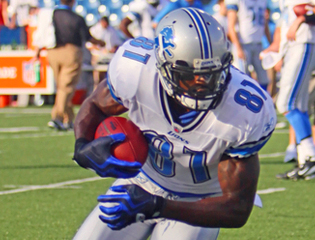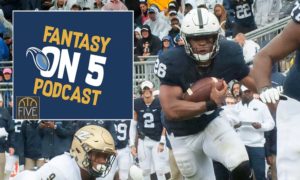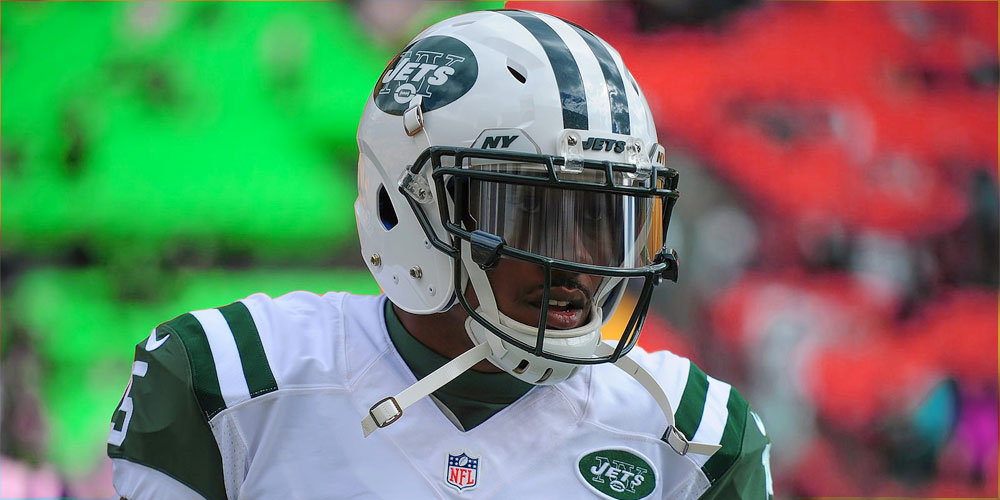In the first part of this look at when you should draft Calvin Johnson, we examined his 2011 season a little closer. We found that while he was great overall, he had some weak spots in the middle of the season. Were those weak spots enough to scare us away from drafting him in the top five or six spots overall? That’s still to be determined.
Value Based Drafting and You
I’ve written a post on VBD already, but if you’re new to the concept, here’s what it is in a nutshell:
“The value of a player is determined not by the number of points he scores, but by how much he outscores his peers at his particular position.”
It’s why Calvin Johnson was so valuable last year. No, he didn’t put up as many points as Ray Rice. And yes, Aaron Rodgers scored more than he did. But that doesn’t really matter. At the end of the day, you win in Fantasy Football when you have the best players at each position.
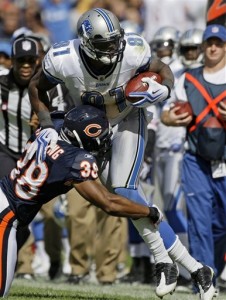
Let’s use a quick, simple example. Using ESPN standard scoring (no decimals), Megatron posted 254 points last season. Rice scored 283. Was Rice more valuable? Well, there are a lot of factors, but when you see that the second-best running back, LeSean McCoy, scored 270 points and Jordy Nelson, the second-best receiver, scored 210, you can conclude that Megatron was much better than his peers. Rice was just a little better.
There are other factors that should go into Value Based Drafting though. For instance, in the example above, it’s more important to see how the worst starter at a position in your Fantasy league performs to more accurately predict the value of a certain player. And it’s important, too, to see where the average draft position (ADP) of certain players and positions lie within a draft. It’s what creates value, and it’s how I concluded Aaron Rodgers was just as valuable as a 9th- or 10th-ranked running back.
When you use VBD to help make your draft selections for the upcoming season, you need projections. Otherwise, you’re relying on statistics that occurred the year before. It’s fine to do that to look at how valuable certain positions were, but if you want to accurately predict where a player should go in a draft, projections are important.
Value Based Drafting and Calvin Johnson
So let’s look at Calvin Johnson. I’m going to be lame and use ESPN projections here. After all, they’re fairly standard, aren’t all that risky and the majority of the people you play against will face similar types of projections when drafting.
This season, he’s projected to score 224 points. If your league starts two wide receivers, and you’re in a 12-team league, then at least 24 total receivers are being started each week. The 24th-ranked wide receiver, Demaryius Thomas, is projected to score 138 points this upcoming season. Therefore, from Megatron to Thomas, there’s an 86-point difference.
Before I get into ADP, let’s take a look at running backs. Arian Foster is projected to score 296 points. The 24th-ranked running back, or the worst starting running back in your 12-team league, Jonathan Stewart, is projected to score 144 points. That’s a 152-point difference.
So from a pure VBD standpoint, Foster is much more attractive than Calvin Johnson. That’s why a lot of people are drafting him first overall. But Calvin Johnson is going sixth overall in most standard drafts. Is that a fair position?
Let’s assume that each wide receiver drafted decreases in expected point value linearly. In other words, the second wide receiver ranked is projected to score “X” less points than the first, and third wideout is expected to produce “X” points less than the second receiver.
Note: This is not entirely true. In fact, over the last six seasons, it’s mostly true of quarterbacks, not wideouts and backs. Running backs and wide receivers actually decrease much more in the early rounds of a fantasy draft, making the early rounds more valuable. I have a full analysis of this in my book: The Late Round Quarterback: It’s Fantasy Football on Steroids.
How Much Better Can Megatron Make You?
When you draft Calvin Johnson sixth overall (1.06), you’re drafting 224 points at the wide receiver position. Furthermore, the 24th wide receiver is being drafted at the end of Round 5 (5.10), and when you get him there, you’re getting around 138 points (Demaryius Thomas’ projection).
As I’ve said, the difference in point total is 86. But it’s not just 86 points. It’s 86 points across roughly five rounds of drafting. In other words, you’re losing 86/5, or 17.2, points every round at the wide receiver position each time you decide to not draft one.
At running back, we’re seeing a drop off of 144 points over roughly the same amount of time (1.01 to 5.08). Therefore, you’re losing 144/5, or 28.8, points each round up until the 24th running back, you decide to not get a running back.
I get it, though. You’re saying to yourself, “alright, that’s good and fine, but when I choose Megatron at 1.06, the value of the running backs available have dropped off significantly.”
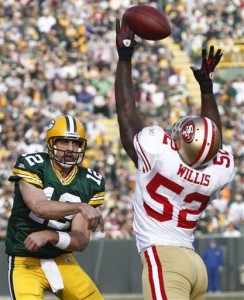
Very true. Because you’re hypothetically not going to draft Calvin Johnson over the first four running backs (Aaron Rodgers is the fifth pick in this year’s draft), let’s push them aside. And let’s assume that the first choice you have, with the sixth overall pick in the draft (Calvin Johnson’s ADP), is to go with either Chris Johnson or Calvin Johnson.
Which Johnson is more valuable? Well, as I showed above, there’s a massive point differential between the best starting back and the worst starting back. But we’re not at the best starting running back anymore. We’re at Chris Johnson, the fifth-best running back. He’s projected to score 215 points — or 81 points less than Foster. The final starting running back, as I noted, Jonathan Stewart, is expected to put up 138 points this season. And again, this is over five rounds of the draft. The difference between the two backs’ point totals is 77 points. And 77/5 is 15.4.
That number, 15.4, is less than the 17.2 I mentioned above. It’s not by much, especially when you consider where the individual picks are instead of just rounds, but it’s less. Value Based Drafting, with rounds included, tells you that it’s more advantageous to get Calvin Johnson with the sixth overall pick than Chris Johnson.
So why do I believe the sixth overall pick isn’t a solid ADP for Megatron? History.
History Would Not Draft Calvin Johnson in the Top 6
Chris Johnson, or whichever running back you have ranked at No. 5, has a fairly accurate projected point value of 215 with standard scoring. It’s slightly lower than what you’d historically expect out of the fifth-ranked guy, but hey, it’s a “new NFL.”
My theory on Fantasy Football is that we shouldn’t assume snippets of historic greatness should occur across multiple seasons. What do I mean by that? Well, Calvin Johnson was on pace to break multiple records in 2012. Clearly it didn’t happen, as he had plenty of games without even getting to 70 yards (which, I realize, is still a decent game).
When there are projections that he’ll score 224 points, we’re assuming that Megatron is going to be scoring 14 points each week.Using standard scoring, that’s averaging 80 yards and a touchdown per game. Given the way the second half of the season went, I’m not sure if he can meet that kind of number.
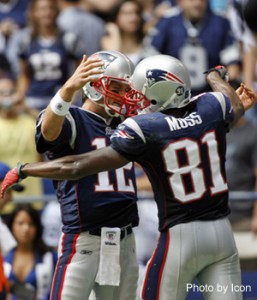 Aside from what Megatron did last season, 224 points hadn’t been attained since Randy Moss’ historical 2007 season. And there’s that word again: historical.
Aside from what Megatron did last season, 224 points hadn’t been attained since Randy Moss’ historical 2007 season. And there’s that word again: historical.
Want more? The last wide receiver to finish as the best Fantasy wideout two seasons in a row was Marvin Harrison. That happened 10 years ago.
Let’s take a look at another concept: touchdown drop-offs.
TheFakeFootball.com did some number crunching and looked at the receiverswho scored 10 or more touchdowns in a season since 2000. Chet, the writer over there, then looked at how those players performed the following year.
Of the 83 possible candidates, just 10 of them had double-digit touchdowns again the next year. That’s 12 percent of 10-plus touchdown receivers.
For a wide receiver, obtaining 224 points used to be easy. But since 2007, things have changed. The NFL is moving to a more spread offense, and receivers lower in the depth chart are stealing targets from even the top-tiered players. This is why we say the wide receiver position is “deep” in 2012.
To show that this is the case, from 2004-07, there were 43 instances of an 85-reception season. From 2008-11, this occurred just 29 times.
To be fair, it’s clear that Calvin Johnson is one of the few remaining wide receivers in this league that is a trueNo. 1wide receiver from a targets standpoint. But we can’t overlook the fact that Brandon Pettigrew is one of the more talented tight end targets in the league, and Titus Young is an up-and-coming receiver that can easily take some looks away from Megatron.
History tells us Megatron won’t do what he did last year again. And while we’re not projecting that he will, we’re still looking for a massive season from the Lions’ receiver.
Calvin Johnson Won’t Drop to Cautious Fantasy Owners
His stats tell us an inconsistent story. Value Based Drafting shows us that the wide receiver position is deep, but Megatron is a lot better than other elite peers.
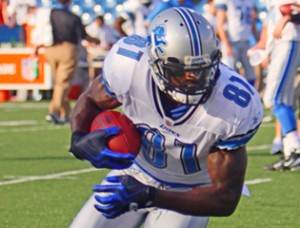
But history suggests he won’t repeat last year’s production. And while his projected point total isn’t nearly as high as what he produced a season ago, it’s still a lofty goal.
Calvin Johnson has a lot of value. I can’t even necessarily tell you that you’re wrong for getting him fifth or sixth overall in your draft. If you believe he can get close to what he did a year ago, then you definitely should draft him.
I’m a cautious Fantasy owner when I make my early round picks. And because I can’t look at his 2011 stats without wincing just a little, I’m probably not going to have Calvin Johnson on my Fantasy team in 2012.
J.J. Zachariason is a self-proclaimed fantasy football expert, blogger at lateroundqb.com, and the author of The Late Round Quarterback: It’s Fantasy Football Strategy on Steroids.

